Sample Letter Of Encouragement To A Child Daughter Teenager Graddaughter Son
[Your Name]
[Your Address]
[City, State, Zip Code]
[Email Address]
[Phone Number]
[Date]
Dear [Child's Name],
I hope this letter finds you in good spirits. I wanted to take a moment to express how incredibly proud I am of you and all the wonderful things you are achieving. As a [daughter/son/granddaughter/grandson] and teenager, you continue to impress me with your determination, resilience, and the remarkable person you are becoming.
Life can be challenging at times, but remember that you are not alone in this journey. Your family and I are here to support you every step of the way. We believe in you and your abilities, and we know that you can accomplish anything you set your mind to.
Your dedication to your studies and your passion for learning are truly admirable. Watching you grow academically is a joy, and I know that your hard work will open up countless opportunities for your future. Embrace the challenges that come your way, for they will only make you stronger and more capable of overcoming any obstacle.
In addition to your academic achievements, your character and kindness shine brightly. Your caring nature and thoughtfulness towards others make us proud to call you our [daughter/son/granddaughter/grandson]. Continue to be a positive force in the lives of those around you, as your actions have a tremendous impact on the world.
Life is full of uncertainties, but I encourage you to face them with courage and confidence. Never be afraid to pursue your dreams, even if they seem ambitious. Remember, some of the greatest accomplishments in history started as daring visions in the minds of extraordinary individuals like you.
It's essential to take time for yourself, too. Balancing responsibilities and leisure can be a challenge, but make sure to engage in activities that bring you joy and relaxation. Whether it's spending time with friends, pursuing hobbies, or simply taking a moment to appreciate the beauty of the world, these moments of self-care will nourish your spirit.
Always trust your instincts and believe in your intuition. You have a unique perspective on the world, and your insights are valuable. Never doubt yourself, for you possess a strength that can move mountains.
Lastly, know that your family's love for you is unconditional. We are here to listen, support, and cheer you on through the highs and lows of life. As you grow and navigate your way through this world, remember that you are cherished beyond measure.
You are an extraordinary individual with boundless potential. I have complete faith that you will achieve greatness and leave an indelible mark on the world. Continue to shine brightly, my dear [daughter/son/granddaughter/grandson], and know that we are forever proud of you.
With all my love and support,
[Your Name]
Heartfelt Encouragement Letter to a Teenage Daughter
Subject: You Are Strong and Loved
Dear [Daughter's Name],
I just wanted to remind you how proud I am of the young woman you are becoming. Life may feel overwhelming sometimes, but I know your strength and determination will help you overcome any challenge.
Always remember that mistakes are part of learning and growing. Keep believing in yourself, and never forget how deeply you are loved.
With all my love,
[Your Name]
Casual Encouragement Message to a Son
Subject: Keep Going, Champ!
Hey [Son's Name],
I know school or sports can feel tough at times, but I want you to remember that every effort you make counts. Keep trying, stay curious, and never give up.
You’ve got this! And no matter what, I’m always cheering for you.
Love,
[Your Name]
Creative Letter of Encouragement to a Granddaughter
Subject: Shine Bright, My Star
Dear [Granddaughter's Name],
I see a bright light in you that can illuminate the world. Even when things get tricky, remember that every challenge is a chance to show your brilliance.
Keep exploring, keep dreaming, and know that your family believes in you wholeheartedly.
Hugs and love,
[Your Name]
Formal Encouragement Letter to a Teen Daughter for School Achievements
Subject: Commendable Efforts and Future Success
Dear [Daughter's Name],
I want to formally acknowledge your hard work and dedication in your academic pursuits. Your commitment and resilience set a wonderful example for your peers.
Continue to strive for excellence, and know that every step you take brings you closer to your goals. We are proud to support you in your journey.
Sincerely,
[Your Name]
Simple Letter of Encouragement to a Teen Son Facing Challenges
Subject: You’re Stronger Than You Think
Dear [Son's Name],
Life can throw obstacles our way, but I know you have the courage to face them. Keep believing in yourself, and don’t hesitate to ask for help when needed.
Remember, I am always here for you, cheering you on every step of the way.
Love,
[Your Name]
Funny and Lighthearted Encouragement Email to a Teenage Daughter
Subject: You’ve Got This, Supergirl!
Hey [Daughter's Name],
Just a quick reminder that even superheroes have days when they feel tired. But guess what? You’re a superhero in your own way, tackling homework, friendships, and life with style!
Keep smiling, keep laughing, and keep being amazing. You’ve got this!
Hugs,
[Your Name]
Provisional Encouragement Letter to a Grandson Starting High School
Subject: A New Adventure Awaits
Dear [Grandson's Name],
High school is full of new experiences and opportunities. I want you to approach it with confidence, curiosity, and an open mind.
Remember, it’s okay to ask questions, make mistakes, and learn from every moment. Your family is here to support and cheer for you always.
Warm regards,
[Your Name]
Quick Note of Encouragement to a Teenage Granddaughter
Subject: Keep Shining
Dear [Granddaughter's Name],
I just wanted to say you’re doing great. Keep chasing your dreams, and remember that I am always proud of you.
Love,
[Your Name]
What is a Letter of Encouragement to a Child or Teen and Why Send It
A letter of encouragement is a personal message aimed at boosting a child’s or teenager’s confidence, resilience, and self-esteem.
Purpose:
- Provide emotional support during difficult times.
- Celebrate achievements and progress.
- Reinforce positive behavior and self-belief.
- Strengthen family bonds and show unconditional love.
Who Should Send a Letter of Encouragement to a Child
- Parents or guardians.
- Grandparents or extended family members.
- Mentors, teachers, or coaches who support the child’s growth.
- Family friends in a caring, supportive role.
Whom Should These Letters Be Addressed To
- Children or teenagers experiencing challenges or transitions.
- Students facing academic or extracurricular pressures.
- Grandchildren as a way to offer guidance and love.
- Any child needing motivation, reassurance, or emotional support.
When to Send a Letter of Encouragement
- Before exams, performances, or competitions.
- After setbacks, failures, or challenging experiences.
- During major life transitions like starting school or high school.
- On birthdays, holidays, or special achievements to inspire confidence.
How to Write and Send a Letter of Encouragement
- Reflect on the child’s personality and current circumstances.
- Use a tone appropriate to their age: playful, heartfelt, or formal.
- Include specific compliments and acknowledge efforts, not just results.
- Share personal anecdotes or motivational quotes.
- Send via handwritten note, printed letter, or email depending on context.
How Many Letters Should You Send
- One letter can be enough for a particular event or situation.
- Multiple letters can be sent periodically to maintain encouragement.
- Use discretion to avoid overwhelming the child with too many messages.
FAQ About Writing Encouragement Letters to Children
Q: Should I correct mistakes or focus only on positives?
A: Focus primarily on positives and effort; gentle guidance can be included without discouragement.
Q: Is it okay to use humor?
A: Yes, humor is effective if appropriate to the child’s age and personality.
Q: Can letters be sent digitally?
A: Yes, emails or messages are suitable, especially for teens comfortable with digital communication.
Requirements and Prerequisites Before Writing
- Understand the child’s current challenges or achievements.
- Choose a tone suitable for their age and personality.
- Have clear intentions: motivation, reassurance, or celebration.
- Prepare anecdotes, quotes, or personal stories for relatability.
Formatting Guidelines
- Length: 100–300 words for readability.
- Tone: Heartfelt, positive, supportive, and age-appropriate.
- Structure: Greeting, expression of support, specific encouragement, closing affirmation.
- Mode: Handwritten notes are highly personal, emails or messages work for teens.
- Optional additions: Drawings, stickers, or small tokens for younger children.
After Sending the Letter
- Check in with the child to see how they feel.
- Encourage discussion or reflection about the message.
- Continue providing verbal support and follow-up encouragement.
Pros and Cons of Sending Encouragement Letters
Pros:
- Builds confidence and motivation.
- Strengthens emotional bonds.
- Provides a tangible reminder of support.
Cons:
- May not be read or fully appreciated if timing or tone is off.
- Overuse may dilute impact.
- Risk of sounding insincere if not genuine.
Compare and Contrast with Other Support Methods
- Letters vs. Verbal Encouragement: Letters are tangible and lasting; verbal encouragement is immediate and personal.
- Letters vs. Gifts: Letters focus on emotional support; gifts are material but can complement encouragement.
- Letters vs. Social Media Messages: Personal letters feel more private and thoughtful than public or digital notes.
Tricks and Tips for Writing Encouraging Letters
- Personalize each letter with the child’s name and specific achievements.
- Keep language simple and relatable.
- Include anecdotes or memories to create connection.
- End with a positive affirmation or motivational quote.
- Use colorful paper or digital graphics for extra engagement with younger children.
Common Mistakes to Avoid
- Using overly complex language for the child’s age.
- Focusing on criticism rather than encouragement.
- Sending letters without reading or considering the child’s current mood.
- Repeating generic phrases without personalization.
Elements and Structure of an Encouragement Letter
- Greeting: Address the child by name.
- Introduction: State purpose of the letter.
- Body: Highlight achievements, provide reassurance, offer motivation.
- Conclusion: Express love, confidence, and support.
- Optional Additions: Quotes, drawings, stickers, or personal anecdotes.
- Signature: Name of sender, relationship to child.

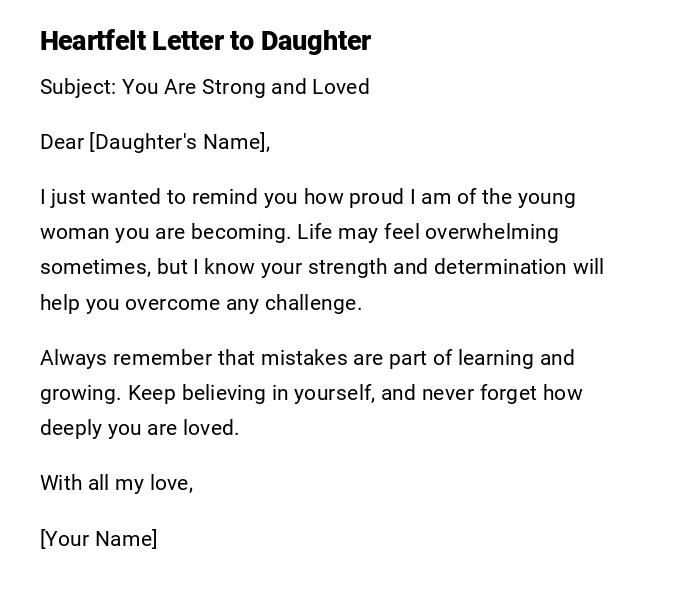
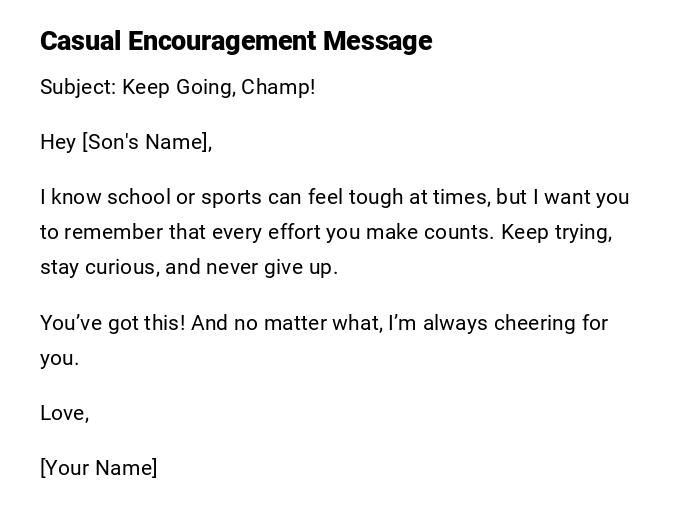
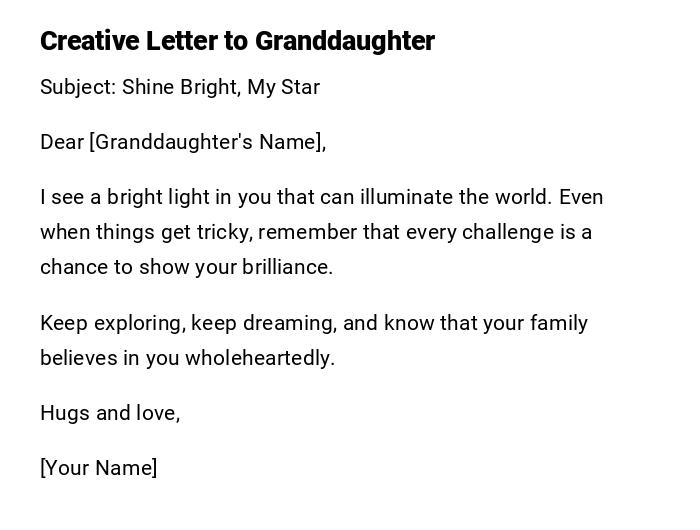
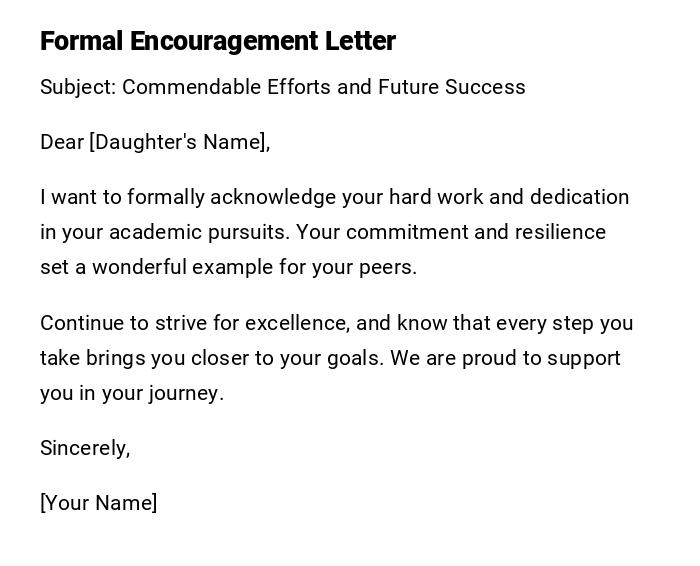
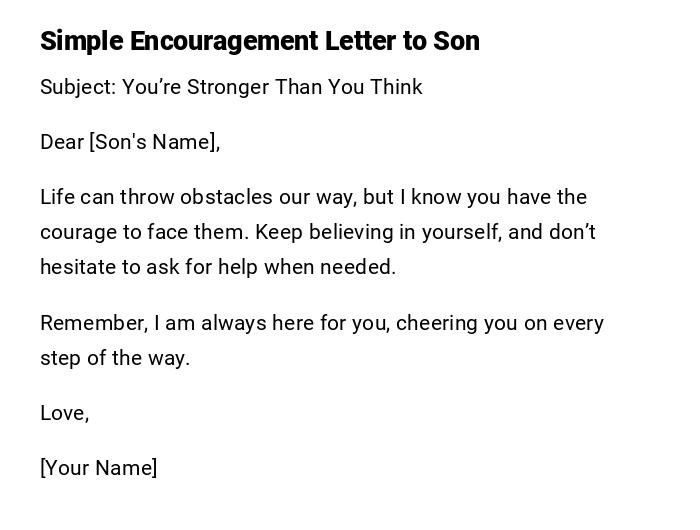
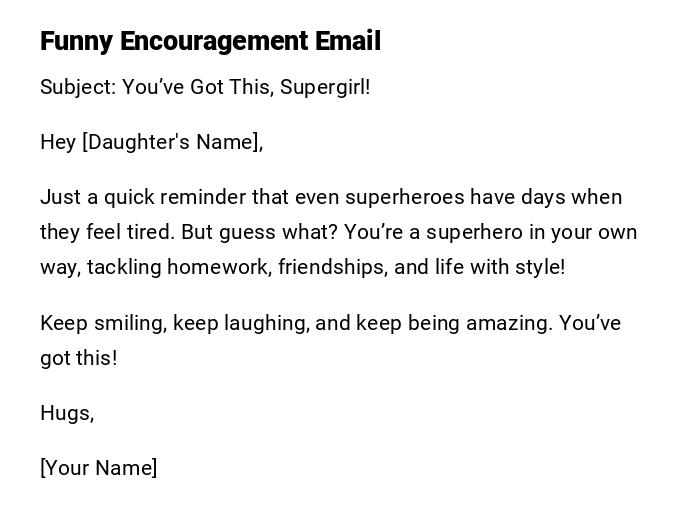
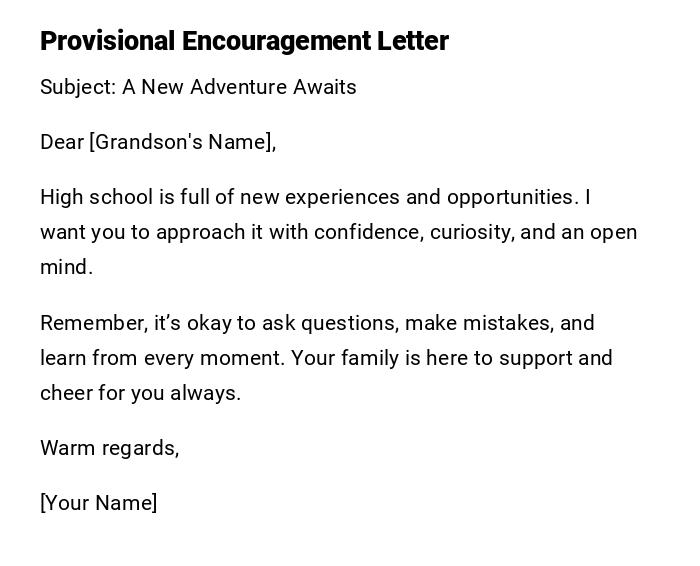
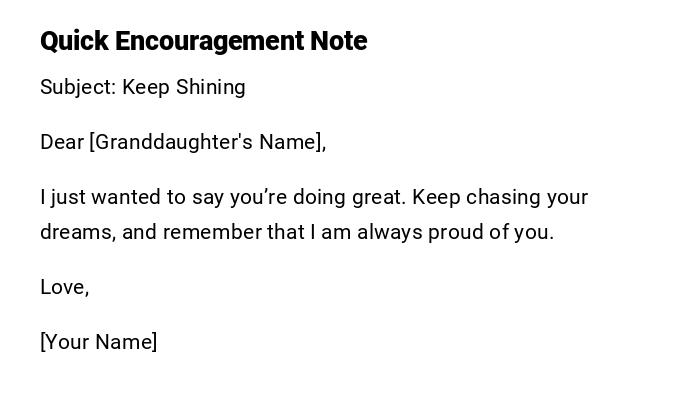

 Download Word Doc
Download Word Doc
 Download PDF
Download PDF